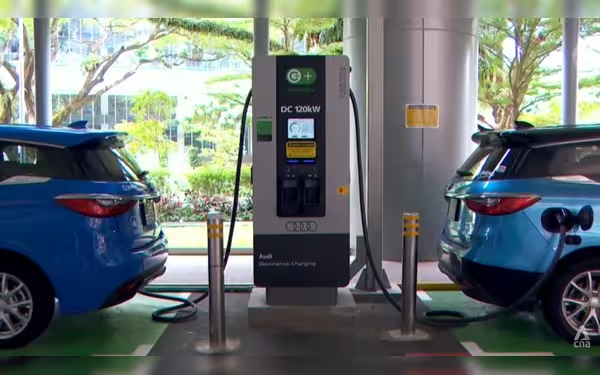Sunday, November 17, 2024 04:39 AM
Singapore Cuts Hybrid Car Rebates, Extends EV Incentives Until 2025
- Hybrid car rebates reduced to S$2,500 from S$5,000.
- EV Early Adoption Initiative extended until December 2025.
- Total rebates for electric vehicles can reach S$40,000.
 Image Credits: channelnewsasia
Image Credits: channelnewsasiaSingapore reduces hybrid car rebates while extending EV incentives until December 2025, promoting cleaner energy vehicles.
SINGAPORE has taken a significant step in its journey towards a greener future by announcing changes to its vehicle rebate system. The government aims to encourage more people to switch to electric vehicles (EVs) while also adjusting the incentives for hybrid cars. This decision comes as part of a broader strategy to reduce carbon emissions and promote cleaner energy vehicles.
In a recent announcement made by the Land Transport Authority (LTA) and the National Environment Agency (NEA), it was revealed that the rebate for hybrid vehicles under the Vehicular Emission Scheme (VES) will be reduced. Specifically, the Band A2 rebate, which currently stands at S$5,000 (approximately US$3,870), will be cut down to S$2,500 starting in 2025. This rebate primarily applies to hybrid cars, which combine an internal combustion engine with an electric motor.
On the other hand, the VES Band A1 rebate, which benefits most electric cars, will remain unchanged at S$25,000. This means that while hybrid car buyers will see a decrease in their incentives, those purchasing fully electric vehicles will continue to enjoy substantial financial support.
The VES is designed to encourage the use of vehicles that produce fewer harmful emissions, including carbon and nitrogen oxides. Under this scheme, buyers of newly registered cars and taxis can receive a rebate on the Additional Registration Fee (ARF), which is a tax calculated based on the vehicle's market value. This initiative is crucial in making cleaner energy vehicles more affordable for the average consumer.
In addition to the changes in the VES, the LTA has also decided to extend the EV Early Adoption Initiative (EEAI) until December 2025. This program, which was first launched in 2021, offers buyers of fully electric cars and taxis a rebate of up to 45% on the ARF, capped at S$15,000. This extension is a clear indication of the government's commitment to promoting electric vehicles and supporting consumers in their transition to greener options.
With these revised rebates and the continuation of the EEAI, buyers of electric vehicles can potentially receive up to S$40,000 in total rebates. This substantial financial incentive has already led to a remarkable increase in the registration of cleaner energy vehicles. Between January and August 2024, approximately 80% of all new car registrations were for cleaner energy cars, with electric vehicles making up about one-third of that total.
Since the introduction of these initiatives in 2021, around 20,000 electric cars and taxis have benefited from the VES rebates and the EEAI. This success story highlights the effectiveness of government policies in promoting sustainable transportation options.
Singapore's decision to cut rebates for hybrid cars while extending incentives for electric vehicles reflects a strategic shift towards a more sustainable future. As the world grapples with climate change, such measures are essential in encouraging the adoption of cleaner energy vehicles. For consumers, this means not only a chance to contribute to a healthier planet but also significant financial savings in the long run. The road ahead may be challenging, but with continued support and incentives, the transition to electric vehicles is becoming increasingly attainable for everyone.













